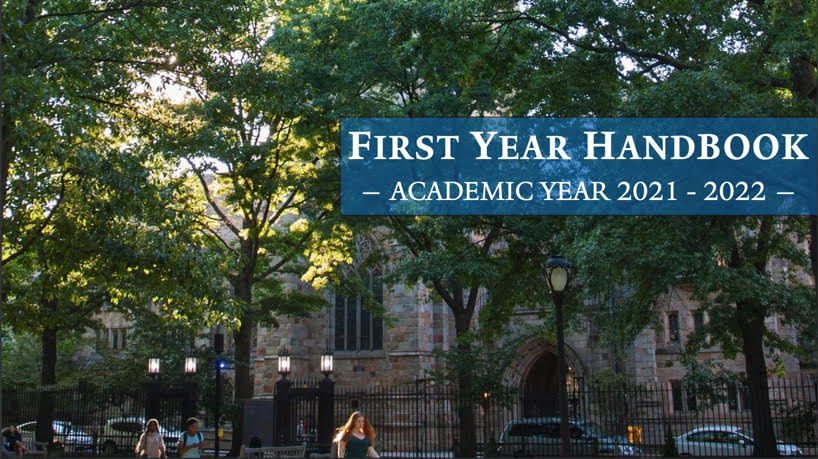YCC’s First-Year Handbook includes new COVID-19 and FGLI resources
The Yale College Council published an updated version of the First-Year Handbook in late August with new sections dedicated to COVID-19 regulations and resources for first-generation, low-income students.

Courtesy of YCC
On Aug. 24, the Yale College Council released the 2021-22 version of the First-Year Handbook, a comprehensive guide to the transition from high school senior to Yale first year.
First created four years ago under the direction of then-YCC President Saloni Rao ’20, the handbook is meant to create a one-stop shop of specific information for first years. Every year, the YCC leadership releases an updated version of the handbook, with this year’s version including — along with relevant dates in this year’s academic calendar — resources for students to deal with the pandemic and a new section specifically for first-generation, low-income students.
“The handbook covers an incredibly wide range of topics, including move-in, academic resources, extracurriculars, technology, sustainability, health and wellness, transportation, and more,” wrote YCC President Bayan Galal ’23 in an email to the News. “Transitioning to one’s first year at Yale can be very difficult, and this handbook is meant to be a comprehensive guide drafted for Yale students by Yale students.”
Yale College also has a website called First-Year and New Student Resources, which contains important administrative deadlines for incoming Yalies. However, the handbook is unique in that it is written by Yale students who went through the transition themselves, Galal added.
Every year, the current president and vice president of the YCC revise the past year’s handbook to reflect changes in Yale policies. This year, for example, the 30-page handbook has COVID-19-specific guidance peppered throughout each section to help students navigate testing policies and general regulations.
“This year’s handbook is different from previous years because it includes guidelines on how to deal with COVID-19, including regulations for move-in, testing, and more,” Galal wrote.
The move-in information includes testing deadlines, vaccination requirements and family visitor policies for Yale students.
In addition to the new public health guidelines, this year’s handbook contains information and resources geared towards FGLI students.
“The handbook this year also has newly added and extended sections, such as an extended section on FGLI resources, put together by YFAM President and YCC Financial Accessibility Policy Director Logan Roberts,” wrote Galal.
This year, class registration took place on Yale Course Search and, instead of a shopping period, students participated in the add/drop period. As such, the YCC included the new guidelines on how to officially register for classes, Galal wrote.
The first section of the handbook is dedicated to move-in day, according to the YCC Facebook page. Dorm regulations, packing tips and COVID-19 requirements for move-in day are all listed within the first few pages of the document. The guide also delves into more general academic information, such as definitions of commonly used terms on campus, explanations of class requirements and lists of first-year specific academic programs.
Extracurricular activities make up the third section, with special sections dedicated to political, cultural or community-related resources at Yale. This section houses the newly-added FGLI section as well as information about voter registration, sustainability and employment opportunities.
The handbook also includes sections on wellness, encompassing all aspects of safety and health at Yale. Links to Yale Health resources, information about spiritual wellness on campus and security hotlines are all listed in the last 10 pages of the document.
“At my high school, our student handbook was 75 pages long and hard to read,” said Andrew Sonneborn ’25. “I really like having all of the information I need in one place, especially since it is so concise and well written.”
The Yale College Council has also written handbooks for STEM majors, pre-law students and those looking for student jobs.







